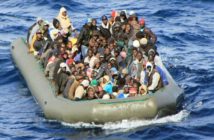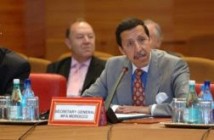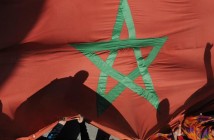
Generic image
THINKSTOCK PHOTOS
A 14-person delegation from the National Newspaper Publishers Association, representing the nation’s black press, returned Sunday from a week-long government-sponsored trip to Morocco as the North African country reaches out to African Americans.
“This is part of series of no-strings attached government-sponsored trips by African American organizations to Morocco to give them a first-hand look at the country,” Cloves C. Campbell, chairman of the NNPA and publisher of the Arizona Informant in Phoenix, told Journal-isms by email.
“No limitations have been placed on what we can write or discuss and we’re under no obligation to write anything. This is the outgrowth of a trip Jesse Jackson took to Morocco in August during which he urged Moroccan leaders to reach out to Black organizations so that they can gain a better understanding of the country and the challenges it faces.”
Leading mainstream news organizations prohibit employees from accepting free trips from governments or other potential sources.
However, journalists not affiliated with those organizations sometimes find such offers too good to resist.
The New York-based America’s Voices in Israel, for example, has been flying Latino journalists to that country in an effort to influence the United States’ growing Latino population, Irwin Katsof, director of the group, has told Journal-isms.
In January 2012, syndicated columnist Ruben Navarrette Jr. told Journal-isms that by focusing more and more on local issues, the news industry is less likely today to support such travel. “The end result is you end up not going,” he said, as happened to him at the paper that laid him off in 2010, the San Diego Union-Tribune, now U-T San Diego. “If I don’t get a trip, I don’t get an education. I don’t grow, and the column doesn’t prosper.” Besides, Navarrette said, “if you can’t sort out the ethical problems in this, you’re in the wrong business.”
On the Morocco trip were Campbell;Denise Rolark Barnes, publisher, Washington Informer, Washington;Michael H. Cottman, Washington-based senior correspondent for BlackAmericaWeb.com; George E. Curry, editor-in-chief, NNPA News Service and BlackPressUSA.com, Washington; James E. Farmer, NNPA Corporate Advisory Board, Detroit;James Gomez, director of international affairs for Rainbow/PUSH Coalition;Bobby R. Henry Sr., publisher, Westside Gazette, Fort Lauderdale, Fla., Hiram Jackson, CEO, Real Times Media and publisher, Michigan Chronicle, Detroit; Kierna Mayo, editorial director, digital, Ebony.com, New York; Askia Muhammad, news director, WPFW-FM, Washington; Francis Page, Jr., publisher, Houston Style magazine; Houston;Elizabeth Ragland, NNPA photographer, Washington; Ingrid Sturgis, journalism professor, Howard University; and Chida R. Warren-Darby, managing editor, San Diego Voice & Viewpoint, San Diego, Calif.
Gary L. Flowers, former executive director and CEO of the Black Leadership Forum, Inc., told Journal-isms by telephone that he went on such a trip with the forum in September and had urged the National Bar Association to undertake a similar trip because he believes “there’s been a culture chasm between Morocco and Black America.” The black lawyers’ group plans to pay its own way to Morocco as about 130 members stage their annual mid-winter meeting. Flowers said African Americans should travel to as many countries as possible.
Morocco rarely figures in American news reports. According to the CIA’s World Factbook, “Influenced by protests elsewhere in the region, in February 2011 thousands of Moroccans began weekly rallies in multiple cities across the country to demand greater democracy and end to government corruption. Overall the response of Moroccan security forces was subdued compared to the violence elsewhere in the region. King Mohammed VIresponded quickly with a reform program that included a new constitution and early elections. . . .”
The State Department reported in May, “There were reports of societal abuses or discrimination based on religious affiliation, belief, or practice, mainly involving converts from Islam to other religions. Christians continued to report societal scrutiny and pressure from non-Christian family and friends. Jews lived in safety throughout the country. . . .”
A State Department report on human trafficking last year said, “Morocco is a source, destination, and transit country for men, women, and children who are subjected to forced labor and sex trafficking. Some Moroccan girls from rural areas as young as six or seven years old are recruited to work as maids in cities and often experience conditions of forced labor, such as nonpayment of wages, threats, restrictions on movement, and physical, psychological, or sexual abuse; however, an NGO reports that the incidence of child maids has decreased since 2005, in part due to government-funded programs promoted in primary school, especially in rural areas, and awareness programs funded by UN agencies and NGOs . . . ”
Conflicts with Western Sahara, a Morocco-occupied, mainly desert territory that has been the subject of a decades-long dispute between Morocco and the Algerian-backed Polisario Front, have also made news.
The Carnegie Endowment for International Peace said in September, “For nearly 30 years Morocco has embarked on an ambitious plan to bring the Western Sahara territory to a developmental level comparable to the national level, with the political objective that development would bring both domestic acceptance of Morocco’s rule within the territory and tacit international acquiescence of its claim over Western Sahara,” Jacques Roussellier wrote in September. Flowers said he did not know about the Western Sahara dispute.
. . . News Groups’ Policies on Expenses-Paid Trips
Associated Press:
Spokesman Paul Colford said by email, “Excursions and junkets are no-no’s at AP.
“There could be some exceptions involving trips, if, for example, flying with a CEO on his or her plane is the only way to get access to the person, such as an extended interview, or if there’s no other way to reach a news scene, such an offshore oil rig, except via an oil company’s own helicopter. But these are rare cases.
“See the last item, marked ‘Trips,’ herein:http://www.ap.org/company/news-values.”
New York Times:
The Times’ ethics policy reads, “Staff members may not accept gifts, tickets, discounts, reimbursements or other inducements from any individual or organization covered by The Times or likely to be covered by The Times.”
Society of Professional Journalists:
SPJ’s ethics policy reads, in part, “—Avoid conflicts of interest, real or perceived.
“. . . Refuse gifts, favors, fees, free travel and special treatment, and shun secondary employment, political involvement, public office and service in community organizations if they compromise journalistic integrity. . . .”
Washington Post:
“We pay our own way,” according to the Post stylebook.
“We accept no gifts from news sources. We accept no free trips. We neither seek nor accept preferential treatment that might be rendered because of the positions we hold. Exceptions to the no-gift rule are few and obvious — invitations to meals, for example, may be accepted when they are occasional and innocent, but not when they are repeated and their purpose is deliberately calculating. Free admissions to any event that is not free to the public are prohibited. The only exception is for seats not sold to the public, as in a press box. Whenever possible, arrangements will be made to pay for such seats. . . .”






